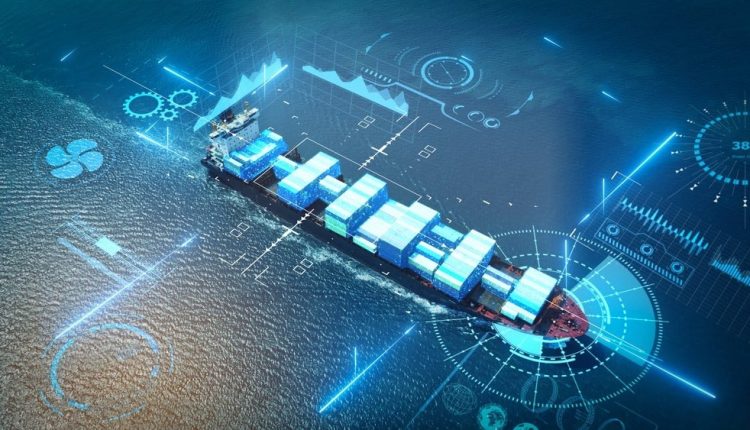**IT Service – Sea News** / In today’s world, modern technologies play a vital role in improving efficiency and reducing costs across various industries. The maritime transport industry is no exception, and by using Artificial Intelligence (AI) and Big Data, it aims to optimize sea routes and increase its efficiency. This report examines the impact of these technologies on maritime transport, highlights the benefits, and reviews leading countries in this field. Additionally, we will explore the necessity of Iran’s entry into this field and how it can be achieved.
**Optimizing Sea Routes with AI and Big Data**
**Weather Forecasting and Safety Improvement:**
One of the most important applications of AI in maritime transport is accurate weather forecasting. By analyzing Big Data from various sources, AI algorithms can predict weather conditions with high accuracy. This information helps captains and transport managers choose safer and more optimal routes, preventing accidents and delays caused by adverse weather conditions.
**Fuel Consumption Optimization:**
Fuel consumption is one of the major costs in the maritime transport industry. Utilizing AI and Big Data analysis can help identify fuel consumption patterns and provide optimization solutions. Advanced algorithms can suggest routes that lead to reduced fuel consumption, thereby lowering costs and greenhouse gas emissions.
**Maritime Traffic Management:**
AI and Big Data can help improve maritime traffic management and reduce congestion at ports. By analyzing data related to ship traffic and using predictive models, the timing of ship arrivals and departures can be optimized, preventing delays and congestion at ports. This leads to increased efficiency and reduced operational costs for ports.
**Leading Countries in the Use of AI and Big Data in the Maritime Industry:**
**USA:**
The United States is at the forefront of using modern technologies in the maritime transport industry. Major companies like IBM and Google are involved in developing AI algorithms to optimize sea routes. Additionally, the U.S. Navy uses these technologies to improve the safety and efficiency of its operations.
**China:**
As one of the largest economic powers in the world, China has made significant investments in AI and Big Data in the maritime industry. Major Chinese ports like Shanghai and Guangzhou benefit from advanced maritime traffic management systems and route optimization.
**Singapore:**
As one of the largest and most advanced ports in the world, Singapore uses AI and Big Data technologies to improve efficiency and reduce ship waiting times. The country is collaborating with technology companies like IBM and Huawei to develop smart port management systems.
**Japan:**
Japan utilizes advanced technologies in its ports to optimize sea routes and manage maritime traffic. Japanese shipping companies use AI to predict weather conditions and optimize fuel consumption.
**Netherlands:**
Given its geographical position and the importance of its ports like Rotterdam, the Netherlands uses modern technologies to optimize maritime operations. By leveraging Big Data and AI, the country improves efficiency and reduces maritime transport costs.
**South Korea:**
As a leader in the shipping industry, South Korea uses AI and Big Data to enhance efficiency and safety in its ports and sea routes. Major South Korean shipping companies use these technologies to optimize their operations.
**The Necessity of Iran’s Entry into the Field of AI and Big Data in Maritime Transport**
**Existing Potentials:**
With access to the Persian Gulf and the Oman Sea and its strategic position, Iran has high potential to leverage modern technologies in the maritime transport industry. Optimizing sea routes and port management can have significant impacts on reducing costs and increasing efficiency.
**Regional Competition:**
Neighboring countries, especially those around the Persian Gulf, are making significant investments in smart and modern technologies. To maintain competitiveness, Iran must quickly enter this field and capitalize on the benefits of AI and Big Data.
**Improving Safety and Reducing Costs:**
Using AI and Big Data can improve the safety of sea routes and reduce operational costs. This is particularly important in the current economic conditions, where there is a need to reduce costs and increase efficiency.
**How Iran Can Enter This Field:**
To enter this field, Iran needs to invest in IT and communication infrastructure, train specialized human resources, and attract foreign investment. Collaborating with international companies and using the experiences of leading countries can accelerate this process.
—
**Conclusion:**
The use of AI and Big Data in the maritime transport industry can lead to significant improvements in efficiency, cost reduction, and safety enhancement. Leading countries in this field have demonstrated that by investing in these technologies, remarkable results can be achieved. Iran, given its geographical position and existing potentials, can benefit from entering this field and using the experiences of successful countries to improve the performance of its ports and sea routes. Enhancing infrastructure, investing in human resource training, and increasing cybersecurity are among the actions that can help optimize the use of these technologies. Ultimately, the use of these technologies not only benefits maritime transport companies but can also have positive impacts on the environment and the global economy.

